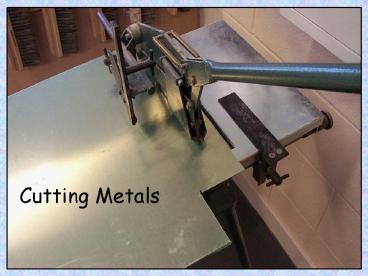Cutting Metals - PowerPoint PPT Presentation
1 / 18
Title:
Cutting Metals
Description:
The Guillotine or Bench Shears are primarily designed for cutting sheet metal ... The main advantage to this guillotine is it's ability to cut accurate strips ... – PowerPoint PPT presentation
Number of Views:217
Avg rating:3.0/5.0
Title: Cutting Metals
1
Cutting Metals
2
Option 1 Hacksaw
The Hacksaw is the most commonly used method of
cutting metal in the school workshop. The main
points to note when choosing a Hacksaw are
- Make sure it has a good blade (no blunt or
missing teeth) - Choose an appropriate blade (Fine teeth for hard
metals Coarse teeth for softer metals) - Make sure the blade is fitted correctly (teeth
should point forward) - Make sure the blade is tight.
3
Hacksaw
Grip the Hacksaw as shown in the picture above
and saw with an even downward force.
4
Hacksaw
Keep the cut as close as possible to the vice.
Too Far
If the blade overheats during use try applying a
little oil.
5
Hacksaw
As shown in the picture on the left one of the
apparent disadvantages of using a Hacksaw is the
limited depth of cut. This can be overcome by
turning the blade through 90 degrees. (As shown
below)
6
Hacksaw
By turning the pins at both ends of the Hacksaw
it is possible to use the Hacksaw for much deeper
cuts.
Blade clamp turned through 90 degrees
Hacksaw cutting beyond apparent maximum depth
7
Option 2 Junior Hacksaw
The Junior Hacksaw is used for cutting small
sections The main points to note when choosing a
Junior Hacksaw are
- Make sure it has a good blade (no blunt or
missing teeth) - Make sure the blade is fitted correctly (teeth
should point forward)
8
Junior Hacksaw
The Junior Hacksaw is used for cutting small
section metals and is used with one hand as shown
in the picture on the left.
9
Option 3 Tinsnips
Tinsnips are used to cut sheet metal. They can
be used in your hand like scissors but its
easier to use them fixed in the vice as shown to
the right
10
Option 4 Guillotine
The Guillotine or Bench Shears are primarily
designed for cutting sheet metal (up to 4.8mm
thick). However they can also be used to cut
round or square section metal (up to 12.7mm
diameter)
Handle Blade Locking Pin
11
Guillotine
Pupils should be aware of the following
Hazards Closing movement between shearing
surface and other parts can result in trapping
and serious injury. Sharp edges on cut material
can cause cuts. (When carrying large sheets of
metal wear gloves) Lack of space around the
guillotine can lead to the operator being pushed
by passers by. Slippery floor surface or loose
items around the machine can cause slips that
result in contact with moving parts. Manual
handling of sheet metal can present a hazard.
Conditions of use. Only one person is allowed
to use this equipment at a time.
12
Guillotine
The Guillotine or Bench Shears are primarily
designed for cutting sheet metal (up to 4.8mm
thick). Remember to keep your fingers well away
from the blade.
13
Guillotine
Shear Hole
The Guillotine can also be used to cut bar up to
12.7mm in diameter. To do this the bar is fed
through the shear hole. (This is the only way to
cut bar on the Guillotine. If you try to cut bar
in the normal fashion you will damage the cutters)
14
Option 5 Gabro Guillotine
The Gabro Guillotine is designed for cutting
sheet metal (up to 1.6mm thick). The main
advantage to this guillotine is its ability to
cut accurate strips from sheets of steel
15
Gabro Guillotine
Pupils should be aware of the following
Hazards Closing movement between shearing
surface and other parts can result in trapping
and serious injury. Sharp edges on cut material
can cause cuts. (When carrying large sheets of
metal wear gloves) Lack of space around the
guillotine can lead to the operator being pushed
by passers by. Slippery floor surface or loose
items around the machine can cause slips that
result in contact with moving parts. Manual
handling of sheet metal can present a hazard.
Conditions of use. Only one person is allowed
to use this equipment at a time.
16
Gabro Guillotine
Guard
Fence
The Fence can be set to any size between 0 and
165mm
17
Gabro Guillotine
Waste Notch
Although the Gabro Guillotine does cut accurate
strips due to the cutting action there is more
waste material produced.
18
The End































